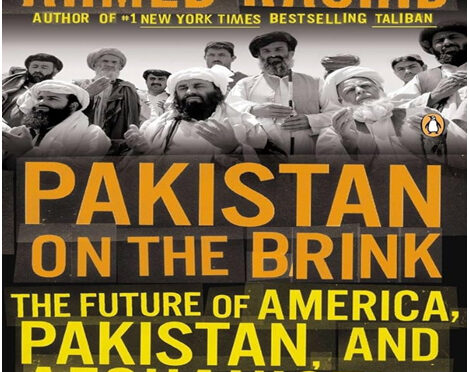BOOK REVIEW
Posted on : March 9, 2024Author : Jaya Singhania

BOOK REVIEW
Rashid, Ahmed (2013). Pakistan on the brink – The future of America, Pakistan and Afghanistan, Penguin UK
Published by: Penguin UK
Date of Publication: 26 February 2013
Length: 256 pages
Price: 1,389 INR drives his personal experience in to it which makes it although
Ahmed Rashid’s trilogy has faultlessly focused on the wars in Afghanistan, political events in Pakistan, and Central Asia framed by the US administrations that have attempted to address these concerns.
The third book of the trilogy i.e. Pakistan on the brink – The future of America, Pakistan and Afghanistan describes events during Obama’s presidency ; the crisis going on in Pakistan and possible solutions to it. As an observer of these events, Ahmed Rashid has considered this period to be exhilarating and hopeful.
The first chapter of the book focuses on the September 11 attacks, also known as Operation Neptune Spear. It chronicles the arrest of Osama Bin Laden and his family members by soldiers from the United States Navy Seal. According to Rashid, Al Qaeda had significantly extended its global network since the 9/11 attacks.
Chapter two implores about Obama dealing with political instabilities in Pakistan. Two weeks before becoming president, he recognized that the Bush administration had overlooked Pakistan’s problems and policies, which could constitute a greater threat to regional stability than Afghanistan itself. Rashid emphasizes the fact that Pakistan could have had an greater economic base because of its geographical location, but the constant political unrest in the country prevented it fromdoing so.
Rashid highlights four problems that have kept Pakistan from stabilizing and becoming a coherent state. First, its political class has failed to forge a cohesive national identity capable of uniting the country.
The second issue dividing the country is Pakistan’s national security paradigm: will it stay India-centric, as established by the military? Or is it to embrace a different vision, as promoted by civil society and the progressive political elite?
Third, Pakistan has evolved into an atypical state that pursues its defense and foreign policies through Islamic militants (jihadi groups, non-state actors) as well as diplomacy and trade.
The fourth factor perpetuating Pakistan’s fragility is the inability of its ethnic groups to find a working political balance with one another, and the failure of Pakistan’s political system, its parties, and its army to help them do so.
The Obama administration inherited an ongoing political crisis. Pakistan, the supply line for the US-led war in Afghanistan, was experiencing significant political, economic, and social turmoil. Pakistan’s rapid slide can be attributed to deteriorating relations with the West and neighboring countries, as well as its reputation as a hub for global terrorism. Pakistan’s strategic location became a liability due to the US-led war in Afghanistan and the influx of jihadis from neighboring nations. In 2011, ties between Pakistan and the Obama administration deteriorated due to blunders and unrealistic expectations.
Afghanistan has been at war for thirty-one years. Obama was not uninformed of Afghanistan’s issues. Unfair elections, unequal seat distribution, war, and economic suffering have exacerbated Afghanistan’s ongoing ethnic conflicts. Obama was stymied by the Bush administration’s failings in Afghanistan from 2001 to 2008, as well as the military’s dominance over US foreign policy following 9/11.
In 2011, relations between the US and Pakistan deteriorated amid rising violence in Pakistan and Afghanistan. Every day, the two countries’ opposing interests conflict. The Pakistani military overlooked the limited options available as the country devolved into turmoil. They also failed to recognize that US unilateralism, including military actions and sanctions, would be used to weaken the Taliban and Haqqani network. In addition to deteriorating ties with the US, the ISI’s backing for the Afghan Taliban and their supporters has caused the Pakistani Taliban, who are much more radical and jihadist than its Afghan counterparts, to spiral out of control. With the army and the ISI at their back, they are fighting to topple Pakistan’s government and driving the country closer to total collapse.
The United States lacked a strategic vision for Afghanistan and the region that it could share or discuss with Pakistan. The US has fostered a key role in the region’s instability, both via actions and inaction. The Obama administration’s lack of particular strategies for the region beyond 2014 has fueled speculation and conspiracy theories. The United States’ desire to maintain a small but permanent military presence or bases in Afghanistan after 2014 has upended neighboring countries.
Pakistanis held the belief that China could compensate the lost economic aid if relations with the US inevitably soured. Given its proximity to Pakistan, China has supported major infrastructure projects in the past, including ports, dams, and roads; it has also contributed significantly to Pakistan’s nuclear weapons and energy programs; and it has given the military heavily discounted heavy weapons valued at several billions of dollars. However, rather than being people to people, the connection between China and Pakistan is mainly military to military. China was unable to obligate Pakistan in the same manner as the US.
Pakistan was now a face of political instability, anarchy and violence among ethnic groups, economic disasters, natural disasters, and the threat of militant Islam, which could overwhelm the security system.
Ahmed Rashid hopes that hopes that younger readers will read the trilogy as a whole, covering a dark chapter in human history from which important lessons were learned to prevent such murder and destruction. The book sternly focuses on the fact how anyone with power and authority can determine a country’s current or future fate. It also linchpin’s the gospel that Pakistanis are hungry for competent, honest, and well-run democratic governance that will challenge the army’s ideology. The book is a good peruse for readers who want to read about Pakistan’s political history, the dominance of the U.S and the abysmal station of affairs of Afghanistan. The trilogy makes a reader clearly delve in to the book as the author encompasses his personal experiences .
Jaya Singhania
Intern, Asia in Global Affairs
The originality of the content and the opinions expressed within the content aresolely the author’s and do not reflect the opinions and beliefs of the website.





Leave a Reply